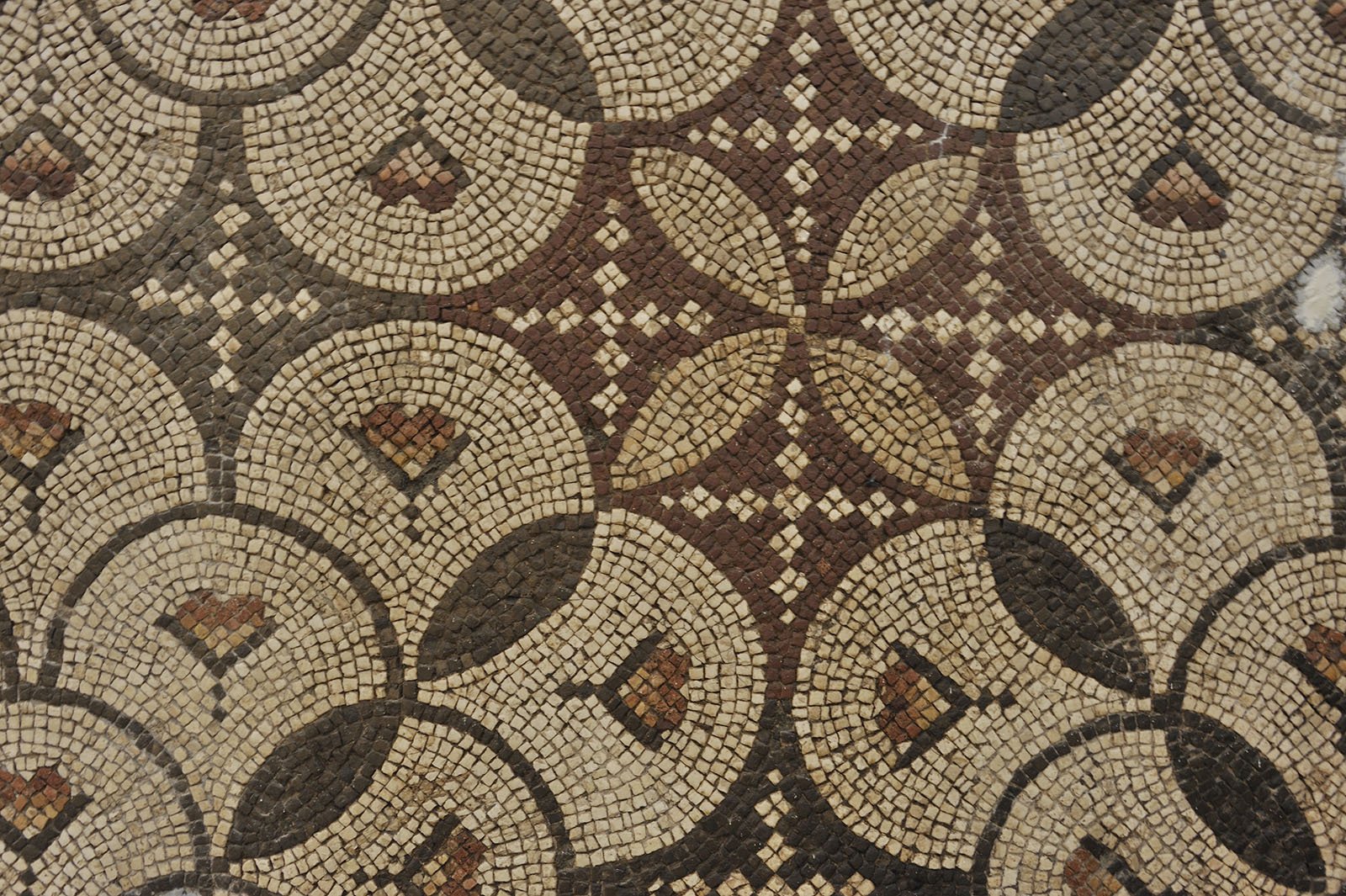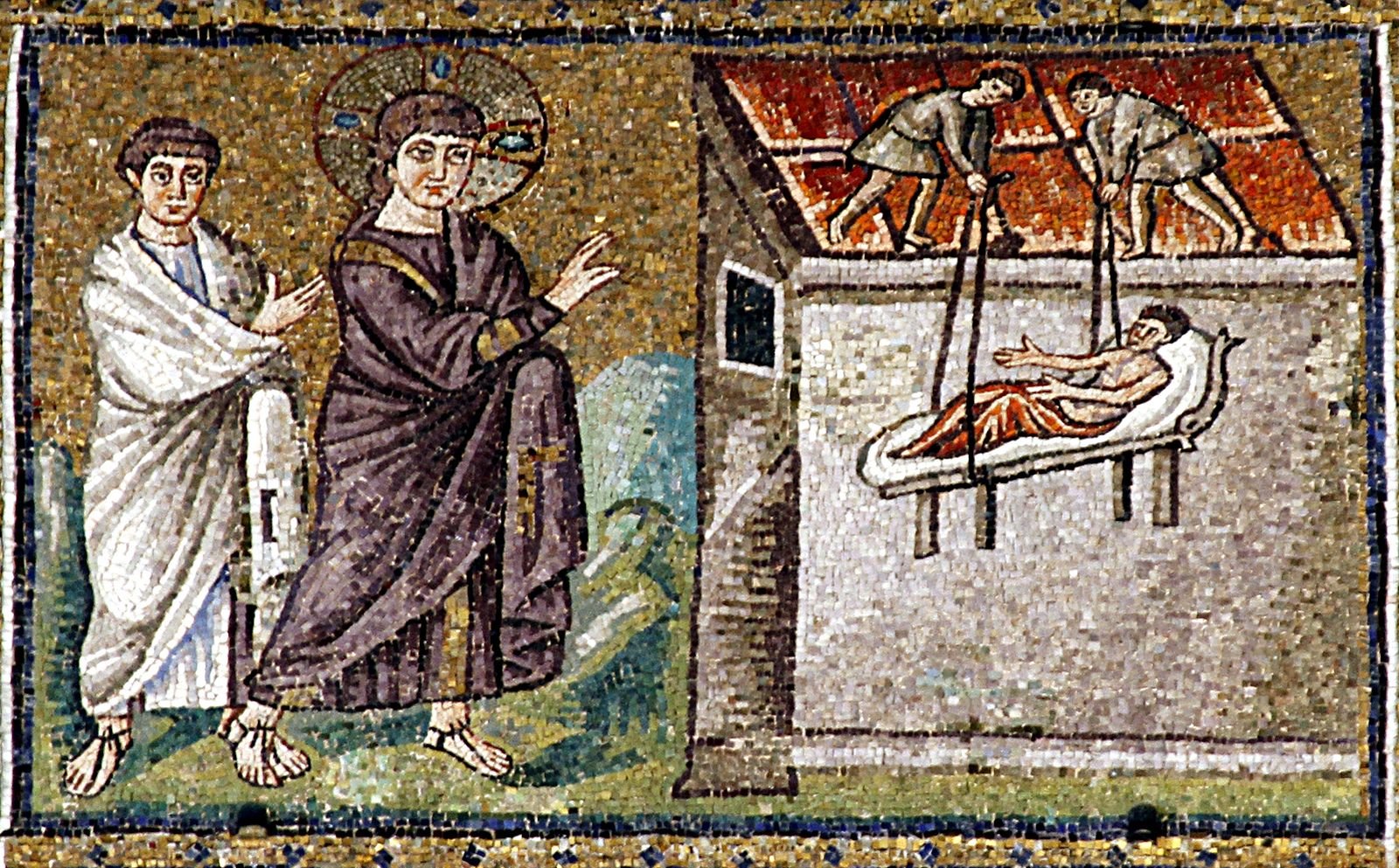37 Weeks and 38 Hours
Elyssa Salinas-Lazarski on pregnancy, labor, and choice as sacred spaces
Geometric mosaic (2nd-4th century), Hatay Archaeology Museum, Antakya, Turkey. Photo: Dosseman
Yielding sacred space
“I’ve called your OB, and we’ve decided to induce,” the doctor said.
I was 37 weeks pregnant, sitting on the exam table with only a curtain separating me from the noises of the hallway: the shuffling of nurses’ footsteps in white Crocs, the constant wheeling of screens or IV bags–and the words that started the 38-hour journey of labor to meet my daughter.
After a lifetime of diet culture, fat-shaming, and a war with my own reflection, I’ve been able to cultivate a deeper relationship with my body. We abide by one another in a peaceful neutrality. I’m finally comfortable taking up space. Before becoming pregnant, I had begun this journey with nourishment and movement, therapy and yoga…it felt like I was finally forming a positive relationship with my body.
Then I got pregnant.
My pregnancy was not only wanted but it was planned, and my daughter was conceived when my ovulation tracker said she would be. Everything had been going according to plan–until the reality of pregnancy hit. There was nausea, exhaustion, and the ever-present brain fog. As a doctoral student, my reading speed and critical eye were my superpowers: I knew how to read a book in a day and take notes with an attention to detail. But once I became pregnant, I found it difficult to concentrate, and the words I tried to grasp slipped through my fingers. The more my belly grew, the more it felt as though the sharp sword of my mind were dulled. Does growing a life mean losing myself in the process? I wondered.
Little did I know the havoc it would wreak on my body, which felt more alien to me than ever before. I was no longer in control of my senses– one whiff of a certain smell would cause nausea to creep up my throat. For someone who rarely got sick, for most of my pregnancy, I spent the mornings feeling nauseous until I ate. My hunger was unprecedented, and my emotions were never in check. My feet ballooned, pushing against the insides of my shoes. My flexibility tightened, and workouts became uncomfortable and nerve-wracking. I would start a routine and then feel faint or dizzy. As my daughter took up more space in my belly, I was both growing with her and shrinking to myself in our shared body. Yes, I was excited about this child to come, but the months to get there felt frustrating and lonely.
I worked through this alienation from body, mind, and spirit by looking forward to the experience of the birth process. While I never felt powerful during my pregnancy, I did want to feel what my body could do through a vaginal birth, to appreciate the pangs of labor and experience the push to meet my daughter. In the contractions and in the breathing, I wanted to encounter the energy of the fertility goddess tattooed on my arm. I was waiting for the chance to feel my body tell me it was time and to bring my daughter into this world. So I bought a yoga ball to help with contractions and imagined playing canasta with my mother during the lulls in the early stages of labor. My husband and I had a bag packed and thought about that drive to the hospital with loving anxiety.
The reality was a much different story.
My 38 hours in labor were spent waiting for my body to want to give birth, and while I waited, every stage of the labor was too medically induced to play mother-daughter games of canasta.
Contractions were helped by an IV bag– not a yoga ball.
Pain was controlled by an epidural, which required a needle in my spine–not necessarily pangs to appreciate.
My water broke thanks to an instrument that looked like a knitting needle.
My cervix was dilated by a balloon, with or without the energy of a fertility goddess.
Finally, my daughter was born via C-section.
After waiting so long to feel the power of my God-given body, I instead felt betrayed by it. That Genesis Creator God who gave me breath? It seemed like She was nowhere to be found in my own creation process. In mourning this experience of labor, I’ve wondered, What happens when we feel as though God has betrayed our very bodies? If God is the potter, lovingly crafting us in the womb, what happens when a part of the body feels disjointed, disconnected, or disloyal?
Healing of the Paralyzed Man in Capernaum (6th century) wall mosaic, Basilica di Sant'Apollinare Nuovo, Ravenna, Italy. Photo: José Luiz Bernardes Ribeiro
Making sacred space
My heart goes to the paralyzed man from the gospels (Mark 2: 1–12; Luke 5:18-25; Matthew 9:1-8). He is brought on a stretcher by four friends to where Jesus is teaching. Because there is no space to get him through the crowd, they carry him to the top of the roof of a nearby home and move the slats aside to interrupt the space where Jesus is teaching. They find a way to lower the man through the slats, his face looking up at the friends who created a space for him to find healing. I think about the weight of this man on the stretcher and what it must have meant for him to lie there, watching as his friends struggle to carry him to Christ.
I remember being wheeled into the operating room when I was preparing for my cesarean section, knowing that I would have to be cut into in order to bring my daughter from the quiet world of my womb and into the harshness of air and light. The tile was an unfriendly mint green, the air sanitized, with a curtain put up between my face and the rest of my body. I heard metal clattering, then felt pressure as my husband sat beside me, watching my face wince with discomfort and confusion. As I lay on the table and my arms were placed outstretched at my sides, tears streamed down toward my ears.
Then I heard her. I heard her voice cry out into the world, “I’m here!” Bringing her into the world required more than what my body was able to give. I needed those medical interventions–from the dripping fluids to initiate contractions to the knife that dug my daughter from the depths of my belly. In truth, God had given me a fertile body, able to conceive, house, and grow my daughter. And in the wake of the birth, there were doctors and nurses who lovingly cared for my body, helping me meet her. It was their hands that had guided me through labor, that put needles into my skin and used instruments to break my water or help me dilate.
After 37 weeks of pregnancy and 38 hours of painful labor, I felt the hand of God—through their hands—lifting my daughter out of my body. It had taken this long for me to feel and hear the voice of God remind me that birth is not about my body being and doing it all alone. I realized that sometimes our bodies need more hands to lower us through a slatted roof or lift a baby from an open belly. God lovingly crafted not only the womb that carried my daughter and the limbs of the paralytic but also the hands of those who lowered, lifted, and healed. Those friends created a place for the paralyzed man where there was none; they interrupted a space for him that led him to get up and walk. Maybe it is in these unexpected, interrupted, or frustrating spaces that we find the sacred ones. The opening of a roof or the parting of skin invite us into the Holy Spirit’s space. Here, what seems like bodily betrayal can become a gift.
"Memorial of the holy martyrs Perpetua and Felicity, arrested in Carthage under the emperor Septimus Severus together with other young catechumens; of these, Perpetua, a married woman about twenty years of age, was a mother with an infant at the breast; while Felicity was a serving girl, who, since she was pregnant, was granted a respite, in accordance with the law, until she was delivered. Though she suffered in giving birth, when thrown to the wild beasts she rejoiced. They processed from prison into the amphitheatre with happy faces, as if looking to heaven."
—From The Roman Martyrology for 7th of March, Dominican Province of the Assumption, 2012
Detail of 6th-century wall mosaic depicting Saints Perpetua and Felicity, Basilica di Sant'Apollinare Nuovo, Ravenna, Italy. Photo and text selection: Fr. Lawrence Lew, O.P.
Claiming sacred space
My daughter is almost four this year. When I look at her, I do not see the pain of her birth but the possibility of her life. She is the gift of my body. And while I look forward to seeing the space she takes up, I am also scared of a future that does not guarantee protecting the rights of her body. Days after Roe v. Wade was overturned, I look back on the experience of pregnancy and giving birth now, and I feel betrayed once again–this time by my government. By judges who lied and took our trust in order to pursue their own ambitions. I am disgusted by their decision; now millions of people will be barred from receiving reproductive care and from feeling autonomy over their own bodies. God often becomes an excuse for many who want to preserve a fetus but do not care about the person who gives up her body to gestate or about what happens once that child is born. This overturning of a constitutional right is not about life. This is about power. This is about control. I look back on my own pregnancies and births, knowing the pain and the sacrifices involved, and to force women to go through that when they choose not to is wrong. In having my tubes tied, I was fortunate enough to exercise that choice. But my heart is breaking for this country and for such an unsure future for my daughter.
These stories remind us to continue to take up space, to interrupt and retrieve the space not given to us. Sacred space can be contentious, but that does not make it any less holy. The stories of my daughter’s birth, the paralytic, Roe v. Wade being overturned, and the uncertain future of reproductive choice remind us that, while space will not always be given to us, there are moments when we must reclaim our bodies, our autonomy, and our space in this world. Our bodies are holy sites of possibility, and when I see my daughter’s, I am compelled to work to keep it her own.




